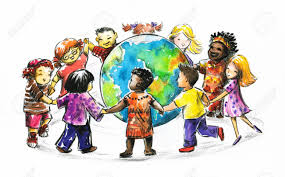Russian-Ukrainian Conflict Affect Food Safety
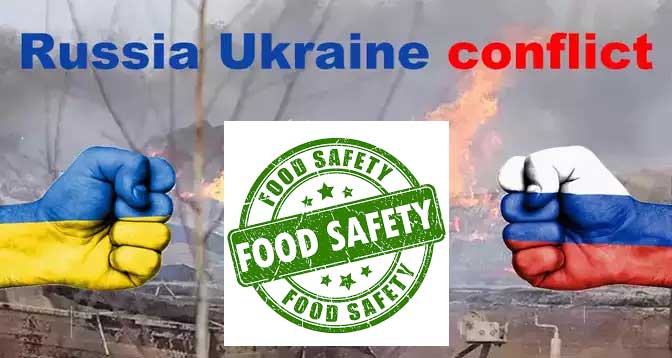
Russian-Ukrainian Conflict Affect Food Safety all over the world. In the short term, it will affect the stability of the global wheat market and disrupt the fertilizer market. In the long run, it will affect the agricultural production of the next planting season. The global pandemic has already affected agricultural production for a long time, and the conflict will exacerbate food safety.
The Granary of The World
Russia is the world’s largest grain producer and the world’s largest exporter of wheat. Ukraine’s black land area accounts for 23% of the world’s black land area. With its fertile land resources, Ukraine has become one of the world’s major exporters of agricultural products and is known as the “granary of Europe”.
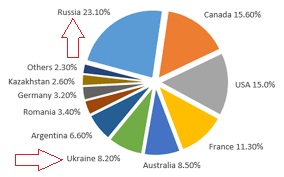
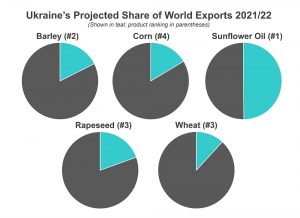
Russia and Ukraine are major exporters of many important grains and oilseeds, with wheat, barley, sunflower seeds and corn among the top five in the world, according to the United Nations Trade Statistics database. Russia’s exports of wheat, barley and sunflower seeds accounted for 24.1%, 14.2% and 19.6% of global trade, respectively; Ukraine’s exports of wheat, barley and corn accounted for 10%, 12.6% and 15.3% of global trade, respectively. Both countries are also important exporters of sunflower oil, with Ukraine accounting for 49.6% of the global market and Russia 23.1%.
Many countries are highly dependent on agricultural products from Ukraine and Russia. For example, more than 50 percent of North Africa and the Middle East’s grain needs, as well as most wheat and barley needs, are met by imports from Ukraine and Russia. The current Russian-Ukrainian conflict will have a direct impact on Ukrainian and Russian grain exports. If the conflict persists, there will be huge uncertainties for agricultural production in the next planting season, as well as for next year’s agricultural harvest.
Fertilizers Prices Increased
Natural gas is an important raw material for the production of nitrogen fertilizers such as ammonia and urea. Russia is an important supplier of nitrogen and potash fertilizers, and its export share accounts for 15% of the global nitrogen fertilizer trade and 17% of the potash fertilizer trade. Belarus accounts for 16% of the global potash export market share. Because Belarus is an ally of Russia, it has also become the target of international sanctions. Sanctions on these two countries will further restrict global fertilizer supply and push up global fertilizer prices. According to World Bank data, European urea prices have soared from $317.6/ton at the beginning of 2021 to $890/ton at the end of 2021, while diammonium phosphate has risen from $494.8/ton at the beginning of the year to $745/ton.
Grain Prices Face New Shocks
Previously, due to factors such as the continued impact of the epidemic, food prices remained high for a while. Today, the conflict between Russia and Ukraine has brought a new shock to grain prices. The food producers of “yesterday” become the recipients of “today”, which will further exacerbate market unease and further increase global grain prices.
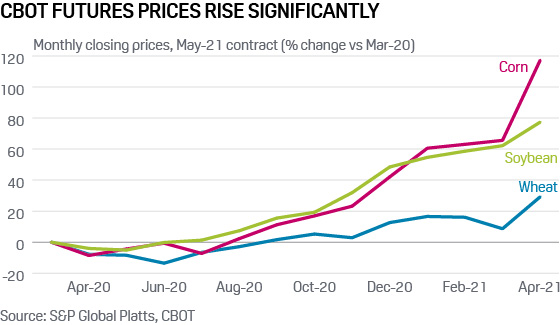
Global Cooperation To Tackle This Crisis
The current Russian-Ukrainian conflict affect global food safety, and indiscriminate sanctions will further aggravate the risk. Sanctions on food, fertilizer and other sectors will only deepen the world’s food shortages, and those who are starving will be the main victims. Governments and international organizations need to strengthen cooperation and take a series of countermeasures. From the perspective of ensuring the food security of the global population, we must ensure that any sanctions imposed on Russia will not affect third parties that rely on Russian exports, and allow grain and fertilizer exports to continue unimpeded.
